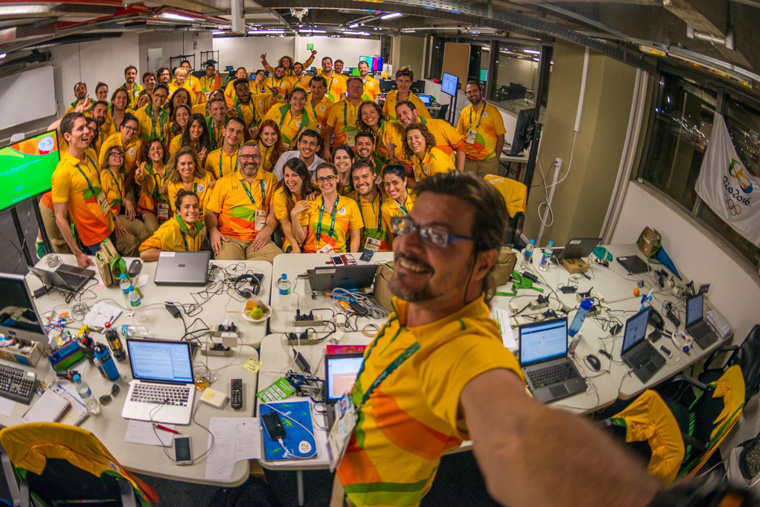Words by Jyoti Mann
Marcelo Albagli is a 2012 London College of Communication graduate who recently worked as a co-designer for the digital communications strategy of the Rio 2016 Olympics.
Marcelo, who studied MDes Service Design Innovation (now MA Service Experience Design and Innovation), returned to the College in November to give current students an insight into how he applied service design principles to the digital strategy of the Olympics.
We caught up with Marcelo, who is himself from Rio De Janeiro, to find out more about the role, how his time at LCC helped him get where he is today, and his exciting future plans…
Hi Marcelo! Can you give us an overview of your role for Rio 2016?
I had to understand the Olympic Committee’s communications challenges and define how these should be addressed through our and our partners’ digital channels . The role involved establishing the fundamentals of the strategy – describing the tactics and practical solutions on how specific programs within the Olympics should develop in the years ahead.
At first I carried out research on recent editions of the Games, mainly Vancouver 2010 and London 2012. I later interviewed managers and other staff in different functional areas, such as ceremonies, ticketing, volunteers, commercial, education, licensing and transportation etc. I invited people from these various departments to participate in brainstorming sessions, to co-create the strategic plan in collaboration with professionals across distinct programs. Drawings, photos and notes spread on to a wall helped me visualise milestones and the overall strategy before putting it on paper. It was a very visual process.
What was the process of developing the Olympic torch relay concept?
The official Olympic flame story is from Greek mythology – it doesn’t make much sense to most Brazilians, it just doesn’t belong to us. As this was the first time the Games were held in South America, this exercise was especially relevant to us. It was a matter of celebrating our diversity.
The brainstorming sessions were based on the research initially carried out by the Ceremonies department, which was also responsible for the Torch. Even though the relay was essentially a massive logistic event – 39,000km in 3 months – the concept needed to be consistent, relatable to people and engaging.
Our objective wasn’t to influence the final design of the torch. However, looking at the drawings produced during our brainstorming sessions, you will be able to spot the final design quite clearly. So the results were beyond my imagination.
My task as a creative leader during brainstorming was to spark the participants’ creativity and to document their ideas. I witnessed the relay being born in these sessions and once the torch was on the streets and the whole country started talking about it, I realised how big that project was. I am very proud I was part of it.
How do you feel Rio has changed since the Games?
Rio is experiencing a deep economical and political crisis at the moment. Still, opinion track surveys say Brazilians were proud to host the Games. Perhaps the ability to deliver the largest spectacle on earth helped improve our self-esteem. The opening ceremony was a clear evidence of that. It exceeded everyone’s expectations. The Games in Rio were beautiful and will go down in history. That might play a role in the future of the country. Let’s see.
What was the greatest reward of the experience?
To learn something new. The Olympics is an extremely complex event – when you find out what works and doesn’t after years of research and planning, this teaches you a lot. For the first time in my professional life I was in the client’s shoes, not in the supplier’s. This new perspective made me better understand where the flaws in the project were. It enhanced my view on the overall product we were designing.
What was the most challenging aspect?
At certain stages during the creative process, one needs to live with uncertainty for longer periods of time. Therefore, designers need to build up trust around them and across teams. As the overall project touched many stakeholders in different areas, I needed to be good at listening to people and encourage collaboration at all times. It was frustrating when an exciting idea was delayed or didn’t come to life due to internal political reasons. But you learn to handle these situations with time.
How did studying at LCC prepare you for a job like this?
It helped me to better understand the creative process and presented me with tools and methods to manage it. It laid out a theoretical framework and made my work more consistent because now I know more about what I like to do. The course was decisive in the way I tackled my job at the Olympics. And it made the experience richer to me.
Do you have any advice for current students of the MA Service Experience Design and Innovation course?
Be fully committed in all units – the course has a lot to offer throughout.
What are you currently working on?
I’ve just been involved on a campaign to elect the new Mayor in Rio. Our candidate didn’t win, but we received 40% of all votes in the city, which was awesome. I believe service design and digital communications will support social transformation more in the upcoming years.
And what’s next for you?
After my talk at LCC I plan to visit South Korea, where the next Winter Games will be held, and the Tokyo 2020 Committee in Japan. I was invited to share my experience in workshops as part of a knowledge exchange program maintained by the IOC in partnership with the local organising committees.
Find out more about Marcelo’s work on his website or follow him on Twitter.



